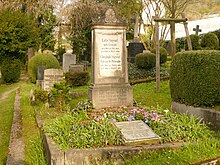Christoph von Sigwart

Christoph Eberhard Philipp Sigwart , from 1875 by Sigwart , (born March 28, 1830 in Tübingen ; † August 4, 1904 there ) was a German philosopher. He was the son of Heinrich Christoph Wilhelm von Sigwart .
Life
Christoph Sigwart studied theology and philosophy and received his doctorate as Dr. theol. et phil. As a student he became a member of the Tübingen royal society Roigel . From 1852 to 1855 he worked as a teacher in Halle . In 1855 he was a repetiteur at the theological seminary in Tübingen . From 1859 he was a professor at the Theological Seminary in Blaubeuren . In 1863 he returned to Tübingen, began teaching at the Eberhard-Karls-Universität and became inspector of the Protestant-theological seminar. From 1865 until his retirement in 1903 he was professor of philosophy. He was in the rank of a royal Württemberg secret councilor. From 1885 he was a corresponding member of the Prussian and from 1901 of the Bavarian Academy of Sciences . He put the focus of his philosophical work on questions of ethics and logic .
The first volume of his major work, Logic , was published in 1873 and is considered to be an important contribution to the philosophy of the late 19th century . Long and careful studies preceded the work. German and English logicians were taken into account. The fifth chapter presents a fundamental study of induction theory by Francis Bacon , John Stuart Mill, and David Hume . The small writings take a critical look at Paracelsus and Giordano Bruno .
1875 Christoph Sigwart was the Knight's Cross 1st class of the Order of the Württemberg Crown awarded with the personal title of nobility ( ennoblement ) was associated. In 1897 he received the commentary cross of this order. As early as 1889 he had been awarded the Commentary Cross Second Class of the Order of Frederick .
Works
- Ulrich Zwingli, the character of his theology, portrayed by Mirandula with special regard to Picus. Stuttgart 1855.
- Spinoza's Treatise on God, Man and Bliss . Gotha 1866.
- Contributions to the doctrine of hypothetical judgments , 1871, again in: Kodikas / Code 23 (2000), 181–248.
- Logic. 2 volumes, Tübingen 1873–1878, translated into English by Helen Dendy in 1895.
- The life story of Giordano Bruno . Tubingen 1880.
- Small fonts . 2 volumes, Freiburg 1881.
- Preliminary questions of ethics . Freiburg 1886.
- The impersonals, a logical investigation . Freiburg 1888.
- Genealogy and history of the Sigwart family . Tübingen 1895.
literature
- Encyclopædia Britannica , 11th edition, 1910-1911.
- Meyers Konversations-Lexikon , 4th edition from 1888–1890.
- Walter Killy and Rudolf Vierhaus (eds.), Deutsche Biographische Enzyklopädie , DTV and KG Saur, Munich 2001, Volume 9, Page 325 f.
- Achim Eschbach: Christoph Sigwart and the roots of pragmatism . In: Kodikas / Code 23 (2000), 179-180.
Individual evidence
- ↑ Download full text (Archive.org)
- ↑ Court and State Handbook of the Kingdom of Württemberg 1877, p. 30.
- ↑ Court and State Manual of the Kingdom of Württemberg 1901, p. 32.
- ↑ Court and State Manual of the Kingdom of Württemberg 1901, p. 78.
Web links
- Literature by and about Christoph von Sigwart in the catalog of the German National Library
- Works on Archive.org (full text)
| personal data | |
|---|---|
| SURNAME | Sigwart, Christoph von |
| ALTERNATIVE NAMES | Sigwart, Christoph Eberhard Philipp von; Sigwart, Christoph |
| BRIEF DESCRIPTION | German philosopher |
| DATE OF BIRTH | March 28, 1830 |
| PLACE OF BIRTH | Tübingen |
| DATE OF DEATH | 4th August 1904 |
| Place of death | Tübingen |
